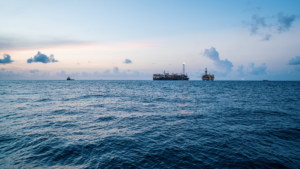Floating Production, Storage, and Offloading (FPSO) vessels have revolutionised offshore oil and gas production by offering a flexible, cost-effective, and environmentally friendly solution to extract hydrocarbons from deep-sea reserves.
In this blog, we will dive into the world of FPSOs, exploring their significance, capabilities, and the future of this game-changing technology.
A Brief Introduction to FPSOs
FPSOs are floating facilities that combine the functions of production, storage, and offloading of oil and gas. These vessels serve as mobile platforms, typically moored to the seabed, allowing for the extraction of hydrocarbons from deepwater reserves. FPSOs are vital components of offshore oil and gas operations, particularly in remote and challenging environments.
The key components of an FPSO include:
- – Production Facilities: FPSOs are equipped with production equipment such as drilling and processing systems, which separate oil, gas, and water.
- – Storage Tanks: FPSOs have storage tanks to store the extracted oil and gas before offloading to shuttle tankers or pipelines.
- – Offloading Systems: They have offloading systems for transferring oil and gas to transport vessels or onshore facilities.
- – Anchoring Systems: FPSOs are moored in place using anchoring systems, which keep them stable in offshore conditions.
The benefits of FPSOs
FPSOs offer several advantages that make them a popular choice for offshore oil and gas production:
- Cost-Effective: FPSOs can be deployed in deepwater locations where constructing fixed platforms is not economically viable. They reduce the cost of offshore production by eliminating the need for extensive subsea infrastructure.
- Mobility and Flexibility: FPSOs are mobile and can be relocated to different fields, extending their operational lifespan. This flexibility allows operators to respond to changing reservoir conditions.
- Reduced Environmental Impact: FPSOs have a smaller environmental footprint compared to fixed platforms. They can be disconnected and moved away during severe weather conditions, reducing the risk of oil spills.
- Fast Deployment: FPSOs can be designed, built, and deployed more quickly than traditional fixed platforms, accelerating production commencement.
- Harsh Environment Operations: FPSOs are designed to withstand harsh weather conditions and are suitable for offshore operations in challenging environments.
- Enhanced Safety: The ability to disconnect and move away from the well during emergencies enhances the safety of personnel on board.
The operational life of an FPSO
The operational life of an FPSO typically involves several phases:
- – Exploration and Discovery: FPSOs are often deployed after the discovery of oil and gas reserves in deepwater locations. The vessel is connected to the wellheads, and production begins.
- – Production and Processing: FPSOs extract, process, and store the oil and gas. This process includes separating oil, gas, and water and stabilising the hydrocarbons.
- – Storage and Offloading: The produced oil and gas are stored in the vessel’s tanks. Offloading can be done via shuttle tankers, which transport the hydrocarbons to refineries, or through pipelines.
- – Maintenance and Upkeep: Regular maintenance and inspections are crucial to ensure the safe and efficient operation of the FPSO.
- – Decommissioning: When the field is depleted or the FPSO reaches the end of its operational life, decommissioning involves disconnecting the vessel, removing equipment, and properly disposing of the FPSO in an environmentally responsible manner.
The Future of FPSOs
FPSO technology continues to evolve to meet the growing demands of the offshore oil and gas industry. Some of the trends and developments shaping the future of FPSOs include:
- – Digitalisation and Automation: The integration of digital technologies and automation systems is enhancing the operational efficiency, safety, and maintenance of FPSOs.
- – LNG FPSOs: The utilization of FPSOs for liquefied natural gas (LNG) production is gaining traction, providing an efficient means to monetize gas resources.
- – Floating Wind Farms: FPSO technology is being explored for offshore wind energy production, marking a shift towards renewable energy applications.
- – Decommissioning and Recycling: As more FPSOs reach the end of their operational lives, innovative decommissioning and recycling methods are being developed to minimise environmental impact.
- – Environmental Sustainability: FPSOs are becoming more environmentally friendly through emission-reduction technologies and practices.
FPSOs in the news
- – Offshore Brazil: Petroleo Brasileiro SA (Petrobras) expects to install eleven new FPSOs in the presalt oilfields in offshore Brazil by 2027 with a plan to produce 2.4 MMboe.
- – Capturing CO2: SBM Offshore and Mitsubishi Heavy Industries (MHI) are teaming up to offer a way to capture CO2 on FPSOs. SBM managing director for floating production Oliver Icyk said the agreement with MHI was a “key development” for its emission ZERO programme.
“The technology, which we are now able to offer clients, is an essential solution to substantially reduce the carbon footprint of our FPSOs. We are pleased to partner up with MHI, a top player whose carbon capture technology perfectly complements our leading experience in floating energy solutions.”
- – Full production: The floating production storage and offloading unit (FPSO) Almirante Barroso, deployed at Petrobras’ deepwater oil field in the Santos Basin offshore Brazil, has reached full production in record time.
“Thanks to the commitment of our technicians and use of new technology, we are continuing to see exceptional results from Búzios, with eleven high production units operating there, equipped with the most modern decarbonization technologies,” said Carlos Travassos, Petrobras’ Director of Engineering, Technology and Innovation.
It is fair to say that FPSOs have transformed offshore oil and gas production, offering a cost-effective and environmentally responsible solution for extracting hydrocarbons from deepwater reserves.
The mobility, flexibility, and ability of FPSOs to operate in challenging environments make them a vital component of the offshore industry. As technology continues to advance, FPSOs will play a significant role in the future of offshore energy production, including the exploration of renewable energy sources and sustainable practices, and Special Piping Materials will continue to supply to this innovative industry.
